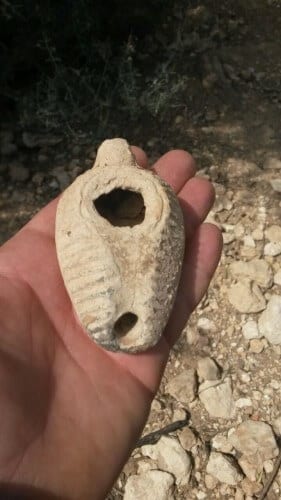Thus, it often happens that the inspectors of the Antiquities Authority collect findings from the waste heaps that form spurs. They make sure to collect the findings according to the order in which they are found, in order to try to understand the periods and extract archaeological information from the ruins.

Last week, during a routine inspection tour by the inspectors of the Robbery Prevention Unit of the Antiquities Authority and members of the Nature and Parks Authority in the ruins of Siv - a large and impressive antiquities site from the Roman-Byzantine period in the Hefer Valley area, an innocent pottery candle (intact) from about 1400 years ago was discovered, resting on the head of A pile of dirt at the edge of a porcupine hole.
The spur is a large rodent that lives in the wild, weighs about 15 kg and has long and flexible black and white spines on its back and sides. It lives in nature in pairs, and lives in dens and burrows that reach 15 meters or more in length. According to Ira Horowitz from the Robbery Prevention Unit at the Antiquities Authority, "the spur is an outstanding archaeologist, from a "tireless digger". The burrow is dug gradually, sometimes 2 meters below the surface, until a living room is formed for him and his family members in the thick of the earth.
Due to the fact that the country is saturated with ancient sites, it often happens that the porcupine builds its home among the remains of the past hidden in the ground. He skilfully removes the dirt to the surface, and along with it a host of archaeological finds that come across his path."
Thus, it often happens that the inspectors of the Antiquities Authority collect findings from the waste heaps that form spurs. They make sure to collect the findings according to the order in which they are found, in order to try to understand the periods and extract archaeological information from the ruins.
That's what happened this week, when during a routine inspection tour, a complete 1400-year-old pottery candle with signs of burning (indicating that it was used in antiquity) was discovered at the top of a pile of dirt at the end of a Durvan pit. The members of the Antiquities Authority examined the pottery and the findings that the spur brought up from the ground, and noted that the findings added information about the date of the antiquities site and the time of settlement there.
The Antiquities Authority calls on porcupines to avoid digging holes in antiquities sites, and warns that digging in an antiquities site without a license is a criminal offense.

4 תגובות
The porcupine lives with the same partner all his life, and helps his partner in raising the puppies. Sometimes there are lesbian couples among the porcupines. Hunting a porcupine is an easy and cruel thing (hit on the head). Its meat is delicious (I have not tried it personally). Regarding the accidental discovery, conspiracies (hypotheses) must be spread to promote research. For example, cannabis prevents autism.
No.
It does not make sense.
What do you call a porcupine to avoid digging a hole?
Sanctions?
Who called the porcupines to stop digging holes?
I want to chat with him/her!
The porcupines are called to avoid digging...
Yes………….
I wonder how the porcupines will react.. a Rothschild protest?
The Antiquities Authority calls on porcupines to avoid digging holes in antiquities sites, and warns that digging in an antiquities site without a license is a criminal offense.
It's a joke, right?
Porcupines are protected animals and have no criminal liability. ha ha